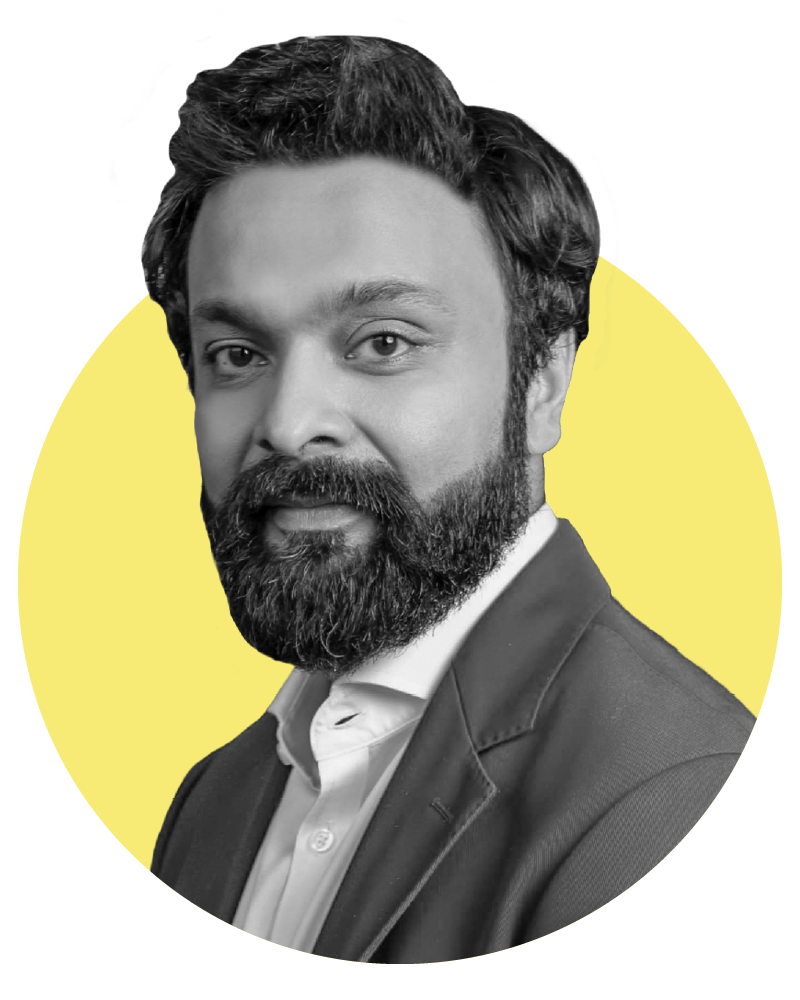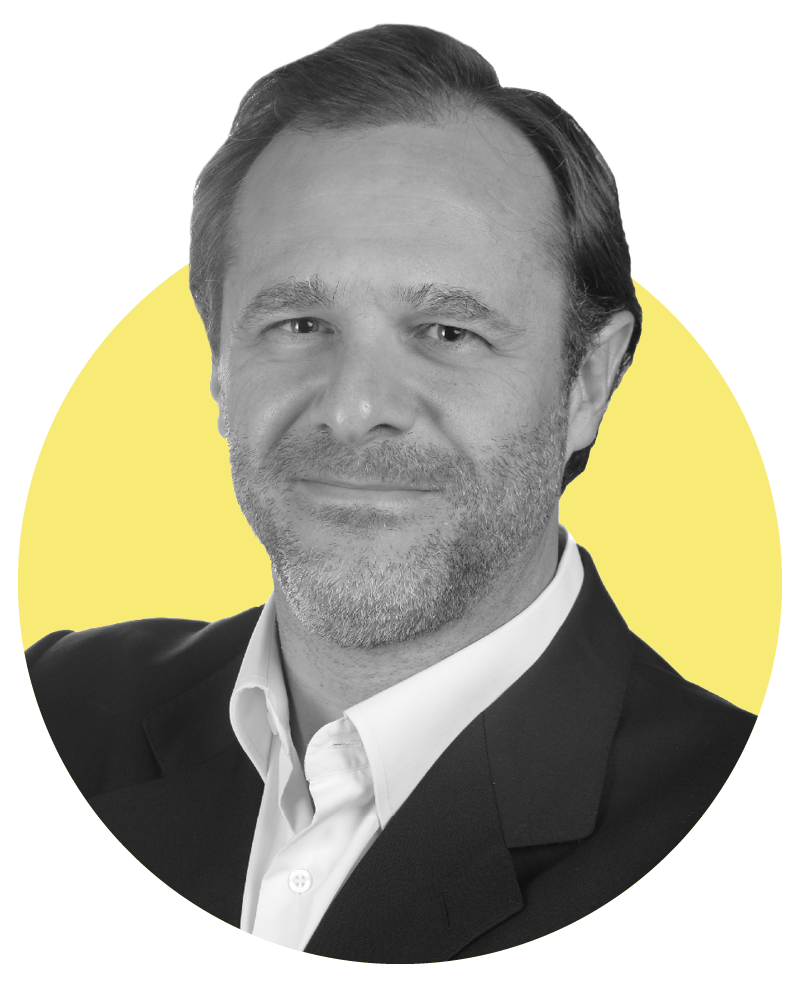
Illustration by Andy Goodman
The sustainability officer, once a rare beast, is becoming increasingly common. It’s a unique role, described as the ‘sense-maker in chief’, who understands the world of environmental, social and governance (ESG), can translate it, and tie it neatly into improved business performance and profitability.
Modus speaks to three sustainability officers about the impact of their roles on the companies they work for.

Anubhav Gupta FRICS
Chief sustainability and CSR officer at Godrej Properties in Mumbai, India. He's also CEO of Vikhroli, for Godrej's own landholdings.
Anubhav Gupta FRICS is the first to describe his job as unusual. As chief sustainability and CSR officer for Mumbai-based Godrej Properties, he’s also chief executive of subsidiary land developer, Vikhroli. He says this reflects the company’s view that sustainability “is not a business vertical, it’s horizontal.” This has given him enormous reach from designing IGBC/LEED/GRIHA green certified rated commercial and residential properties to leading decarbonisation programmes and devising watershed projects for carbon offsetting.
Gupta joined the company nine years ago to lead on design and sustainability, and as CEO of Vikhroli. Using his background as an architect he set up GPL Design Studio to focus on eco-buildings.
But two years ago, his focus shifted. “ESG was really coming to the fore and I realised we needed to do a lot more on sustainability,” he says. “It’s not just about green buildings, it’s much wider.” He stepped back from his design function to focus on his role of chief sustainability officer (CSO).
The Godrej Group, its $1.4bn parent company, had committed to becoming water positive, carbon neutral and to minimising waste going to landfill. Gupta says he started to look at the wider carbon footprint of properties: “I realised there’s no point at just looking at part of this, we have to look at the whole life cycle.”
He started by mapping data and measuring how much carbon Godrej was expending. “We didn’t even know how much carbon we should be emitting,” he recalls. Using data and case studies he was able to reduce operational carbon emissions and overall, the Godrej Group has reported a 53% reduction.
Gupta is now targeting its value chain emissions, which are complex and much more difficult to influence. Through its tendering process it has mandated that suppliers working with Godrej must record and report their carbon emissions. But it will still need carbon offsets to reach its targets, and Gupta says he saw an opportunity to “pull in” their CSR programmes and create projects with much bigger impact. They were able to work with the government, through a CSR project, on a large watershed project in Beed, Maharashtra which matches corporate spending. These are projects across India to regenerate and rehabilitate land. “We were able to green that land and plant loads of trees, so we got carbon sequestration from that and lots of additional positives,” says Gupta.
When the COVID-19 pandemic hit, India suffered one of the worst migrant worker crises in the world. Gupta describes it as “chaos”, with many returning to their villages without support. “We said this is our workforce, we should be doing something about this, it is not sustainable.” There were government funds these workers were entitled to, but they needed to be registered and many were not “digitally literate,” says Gupta.
Working with NGOs, Godrej set up a registration scheme but found it was far from simple, with different rules in different states. “When you open one can of worms there are often loads more, but we are getting there, and we are on a good path.” He adds that he’s also proud of its pilot urban farm at one of its developments, which ended up providing nearly 120kg per year of food to the residents during the pandemic.
Gupta says he’s set out a three-year roadmap and can see real progress, already achieving water positive status, and he’s now focused on reducing waste to landfill. Reporting will play a major part of this roadmap, particularly for overseas investors, and he says linking money with sustainability has enabled him to put a business case to colleagues and secure their commitment. He now publishes a dashboard every quarter so Godrej Properties’ 1,900 staff can see progress. “People get very excited about it,” Gupta says. “We’ve even created awards around it. We’ve made sustainability interesting and fun.”

“People get very excited about it... we’ve made sustainability interesting and fun” Anubhav Gupta FRICS, Godrej Properties

Corrina Jones MRICS
Environment and sustainability manager at e.surv Chartered Surveyors in Cardiff, Wales
“ESG is going to touch on every aspect of every business moving forward,” says Corrina Jones MRICS, environment and sustainability manager for e.surv Chartered Surveyors. She describes her job as two-fold, helping clients understand and adjust to the decarbonisation agenda and implementing and managing e.surv’s environmental strategy.
An average week can include training the company’s 600 surveyors on the latest renewable energy technologies, writing technical papers for its internal hub or assessing a pilot of EV vehicles for its extensive fleet. She says the fundamental parts of her role are “trying to keep on top of everything” and education. “Some aspects are quite challenging. It’s a big ship to steer and sometimes people don’t like change,” says Jones.
She says her job entails constantly explaining what she’s doing and outlining the risks of not acting now, plus the benefits. “I have to tread a fine line. I wouldn’t want to say to people, ‘you have to do this’, I want them to want to do it.”
Along with the monthly ‘green watch’ newsletter Jones compiles, she is also developing modules to feed into the company’s continued professional development (CPD) programme, including one for home workers on energy efficiency. She also works with the product innovation team that is developing more green products and presents regularly to lender clients on the impact of climate change.
“You know you want to make a difference and to have an impact” she says. “We all need to behave responsibly if we are to revise and reverse the impact climate change will have.”

“I wouldn’t want to say to people, ‘you have to do this’, I want them to want to do it” Corrina Jones MRICS, e.surv Chartered Surveyors

Agustin Garcia del Castillo Calvo MRICS
Sustainability officer at Siemens Smart Infrastructure in Zug, Switzerland
“The most interesting thing for me is to be able to bring the entire sustainability approach to our work portfolio,” says Agustin Garcia del Castillo Calvo MRICS, sustainability officer at Siemens Smart Infrastructure.
He volunteered for the role in 2018 after realising that the business lacked a sustainability lead at an operational level. To start with he said he was a “lone-rider” trying to influence change, but in the last 18 months sustainability has become really embedded in the company.
The former real estate managing director oversees sustainability both internally and with the €14bn company’s customer base. “One part of my job is operational – covering procurement, supply chain, production and manufacturing,” he explains. “And the other is externally focused, on our customers and our value propositions.”
He says Siemens has a diverse portfolio, from smart building systems that optimise energy use, to grids for power distribution. “My main contribution is to help the product managers and the salespeople really think about sustainability as a long-term topic so we can provide long-term answers. It’s what we call technology with purpose.”
The company has been working on its 2030 carbon neutral programme in its global factory network since 2014. Here, he says, it has taken a holistic approach, including buying 90% of electricity from green sources and even producing its own energy. So far it has reduced carbon emissions by over 50% and Garcia del Castillo Calvo is looking to expand the programme in Siemens’ other businesses.
He says the real beauty of his job has been collaborating with other sustainability officers: “It’s a very good way to have fresh air outside of the company and know what others are doing in different sectors. I can be talking with a sustainability officer at a food and beverage company or real estate or chemical company. It’s very enriching. I can exchange ideas with them and offer support from our experience.”

“I help the product managers and the salespeople think about sustainability as a long-term topic so we can provide long-term answers” Agustin Garcia del Castillo Calvo MRICS, Siemens Smart Infrastructure

Developing the world’s first energy positive hotel
At the base of Norway’s Svartisen glacier Read more

